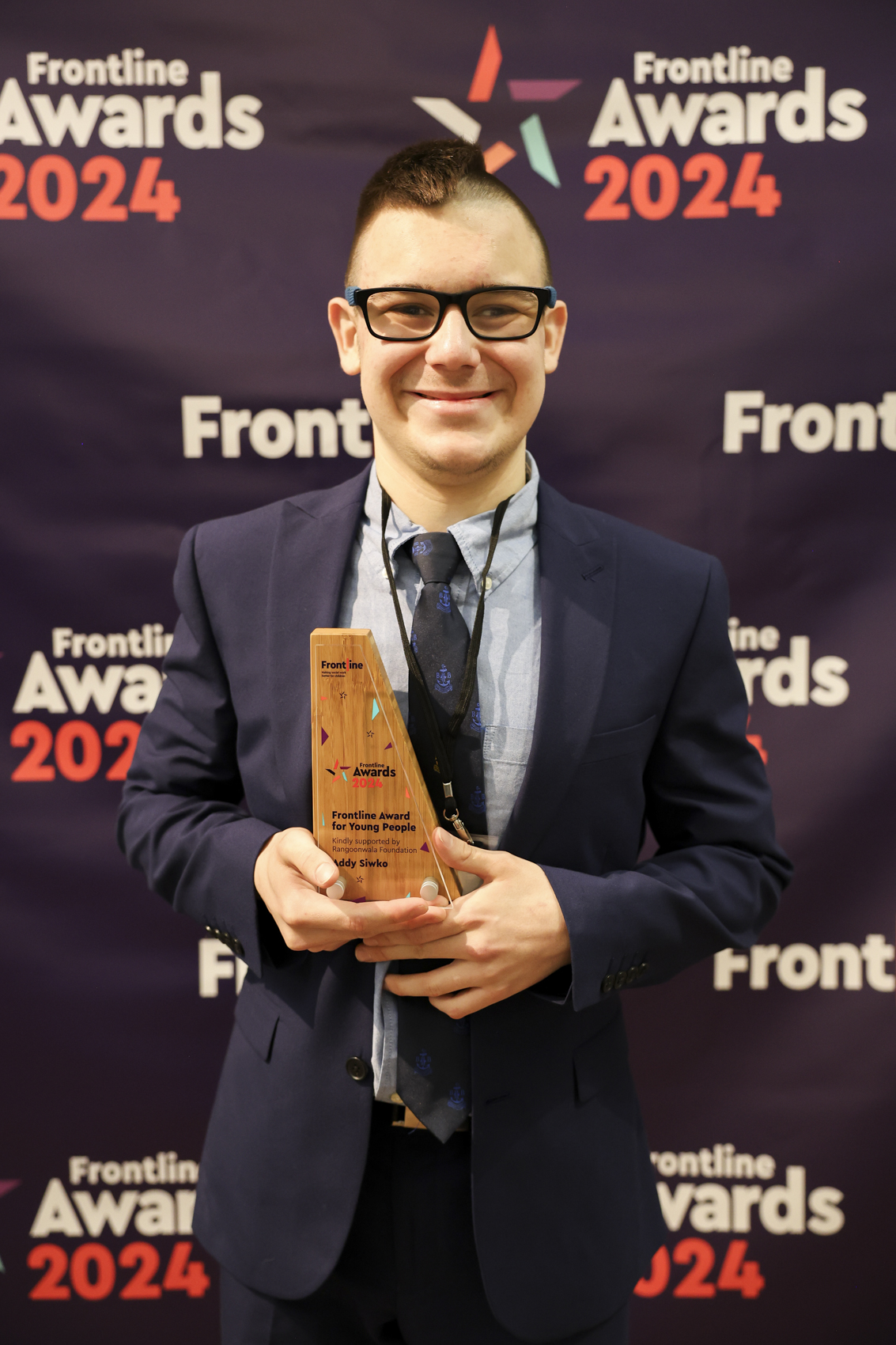
Sue Williams, the mind behind the family safeguarding model, has been recognised for her outstanding contribution to children and families in the second annual Frontline Awards.
Her award was presented by chief social worker for children Isabelle Trowler, who described Sue as “a leading light in bringing change and innovation to children’s social care across England”.
“Her incredible tenacity, intellectual clout, creativity and commitment to the sector has made a huge and lasting contribution, not just to every practitioner she’s influenced, but to every child and family that they in turn have supported,” she added.
Sue, now programme director of the Centre for Family Safeguarding Practice, conceived the model in 2015 when assistant director of children’s services in Hertfordshire council. She secured funding from the Department for Education’s (DfE) innovation programme to test it in the county.
Family safeguarding involves teams of children’s social workers and specialist adults’ practitioners using techniques such as motivational interviewing to tackle the root causes of adult behaviours that increase concerns about children, particularly domestic abuse, substance misuse and mental health difficulties.
It reduced the number of children going into care and onto child protection plans and was seen by parents as “participatory, supportive and empowering”, found a 2020 evaluation for the DfE, which has subsequently supported its rollout across the country. It has so far been adopted by 23 areas in England.
‘Challenge your biases’

Helena Oatts (photo by Frontline)
The outstanding contribution gong was one of two new additions to the Frontline awards line-up, the other being participant of the year, which recognises a trainee on the charity’s fast-track social work course.
This award went to Helena Oatts, who was praised for being a “fierce advocate for children and families and practising with empathy and passion”.
“I love every moment of [being a social worker] and to be recognised for doing something you enjoy is absolutely amazing,” she said of her win.
“I’ve always been someone who has loved people, I think there’s something in everyone that we can all resonate with.”
Helena’s piece of advice for future social work students was to always believe in themselves but also challenge their biases.
“We all have biases, but you have to be open to challenging the views that you have about the world and about yourself. Keep an open mind. When you’re meeting families, you might have a slight idea of what could be going on, but keep challenging yourself, there could be multiple truths and possibilities.”
‘It’s important for young people to feel seen, loved and wanted’
Addy Siwko, Annie Whitley, and Artur were selected as winners of the award for young people.

Addy Siwko (photo by Frontline)
Addy, who lives with cerebral palsy, set up his own car wash business to raise money for a charity raising awareness for the condition and, more recently, wrote a song, ‘I Can Do Anything’, about his disability not holding him back in life.
Annie has led a consultation on making care experience a protected characteristic, secured a household living fund for care leavers and helped review, reshape and relaunch children’s residential care in her area.
Artur is the chair of a children’s active involvement service and, for the past five years, has worked to improve support for care leavers. He has set up a food and toiletry bank, lobbied for suitable housing for care leavers and managed to increase care leaver allowances from £1,500 to £3.000 in his area.
Speaking to Community Care, he called for better funding towards allowances and housing placements for care leavers and said he would continue to advocate for a “better service so that young people have the best and easiest experience”.
He advised practitioners working with children to do everything “with their hearts and mean it”.
“A young person can always tell when a social worker means what they say,” Artur added. “Social workers do kind of take on the role of a parent so it’s really important for the young people [they support] to feel seen, loved and wanted by them.”
Big night for Islington

Kenneth Atigah (photo by Frontline)
The London Borough of Islington saw two of its practitioners go home with an award – Celia, who won the leadership award for her commitment to improving social work practice, and Kenneth Atigah, who won the award for practice.
Celia has helped deliver multiple initiatives, including the edge of care service, which provides prevention support for children and young people at potential risk of needing to become looked after.
Kenneth left Ghana for England in 2008 and has spent years caring for his autistic cousin, whose social worker inspired him to join the sector.
Other winners included Kasey Thompson, who won the fellowship award for being “an integral part of Frontline’s racial diversity and inclusion steering group”, and Darlington council’s Staying Close team, which won team of the year for their work supporting 22 young people transitioning from children’s homes or supported accommodation to independent living.
‘When we respond to sexual exploitation, we need creative approaches’
The final award, for innovation, went to Jo Ritchie for her decade-long work on sexual exploitation, including setting up ‘Night Light’ with Avon and Somerset Police, which sees professionals partnering with sex workers to support and identify children at risk.
“This award is very much shared with the women. They’ve been so instrumental and we couldn’t do Night Light without them,” she said.
“I think so often sex workers are criminalised, demonised and totally misunderstood. The women I know and love have the biggest hearts, are the bravest people – they keep on surviving. And the fact that they’ve got the strength to safeguard children, it’s phenomenal.”
She said that in the last few months, her team has responded to 12 children and gathered “lots of information on other children at risk and customers that can be dangerous”.
Her advice to professionals working to safeguard young people from sexual exploitation is to be creative in their approaches.
“We need to think about where the gaps are and how we can intervene in a way that will meet people where they’re at and make a difference. I think sometimes the more traditional responses don’t work, so it’s about being creative.”
‘Making space to ‘celebrate social workers’ brilliant work’
Introducing the awards, Lord Tony Hall, Frontline’s chair of trustees, said: “At a time when children and families are experiencing more complex issues and worsening living conditions, it is so important that we make space to celebrate the brilliant work that social workers do day in and day out.
“The endless commitment and support that they give to children and their families can help to provide both the essential tools and hope for a brighter future.”
You can read more about the other nominations and winners on the Frontline website.



 Bournemouth, Christchurch and Poole
Bournemouth, Christchurch and Poole  Hampshire County Council
Hampshire County Council  Lincolnshire County Council
Lincolnshire County Council  Norfolk County Council
Norfolk County Council  Northamptonshire Children’s Trust
Northamptonshire Children’s Trust  South Gloucestershire Council
South Gloucestershire Council  Wiltshire Council
Wiltshire Council  Wokingham Borough Council
Wokingham Borough Council  Children and young people with SEND are ‘valued and prioritised’ in Wiltshire, find inspectors
Children and young people with SEND are ‘valued and prioritised’ in Wiltshire, find inspectors  How specialist refugee teams benefit young people and social workers
How specialist refugee teams benefit young people and social workers  Podcast: returning to social work after becoming a first-time parent
Podcast: returning to social work after becoming a first-time parent  Podcast: would you work for an inadequate-rated service?
Podcast: would you work for an inadequate-rated service?  Family help: one local authority’s experience of the model
Family help: one local authority’s experience of the model  Workforce Insights – showcasing a selection of the sector’s top recruiters
Workforce Insights – showcasing a selection of the sector’s top recruiters 

 Facebook
Facebook X
X LinkedIn
LinkedIn Instagram
Instagram
Comments are closed.